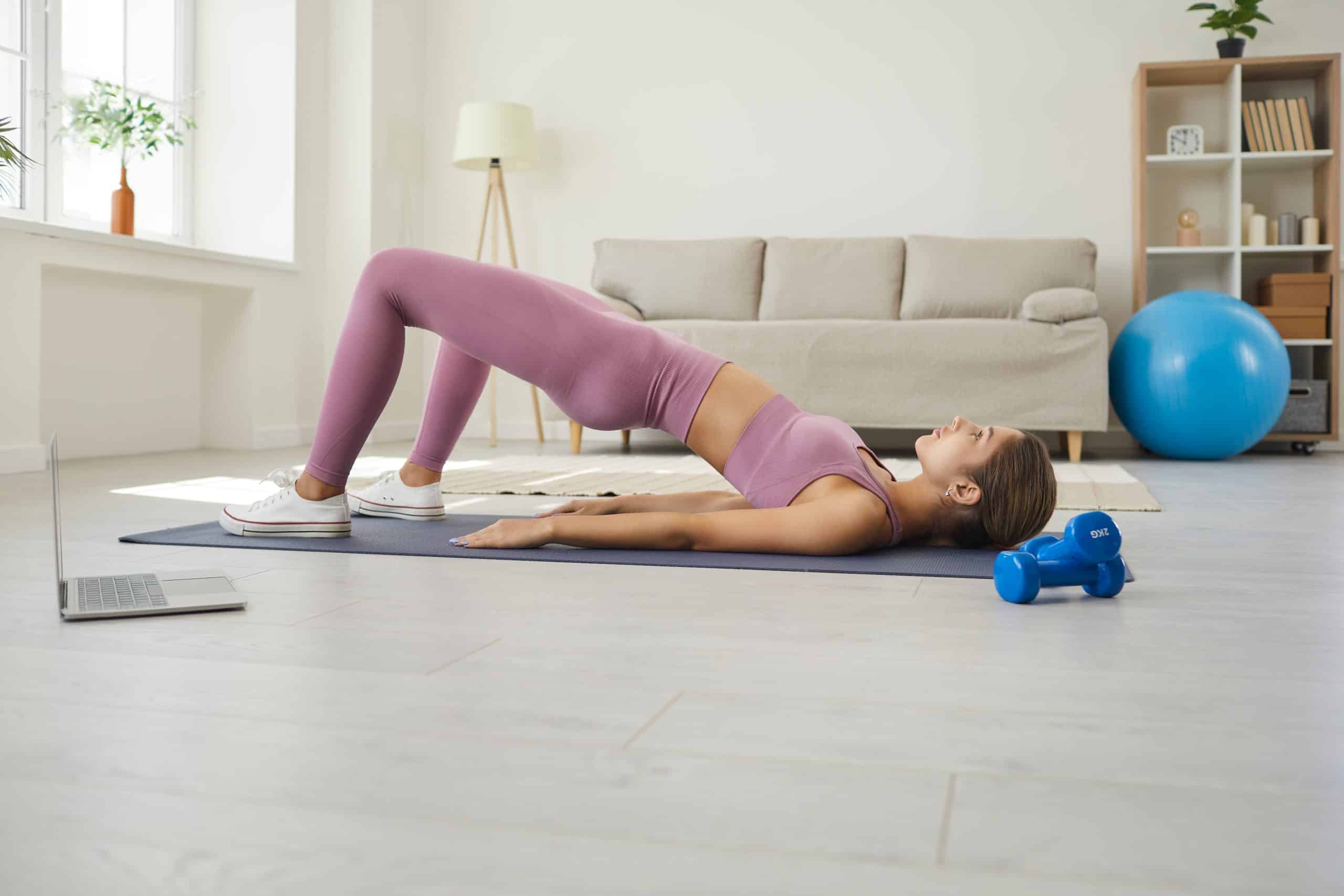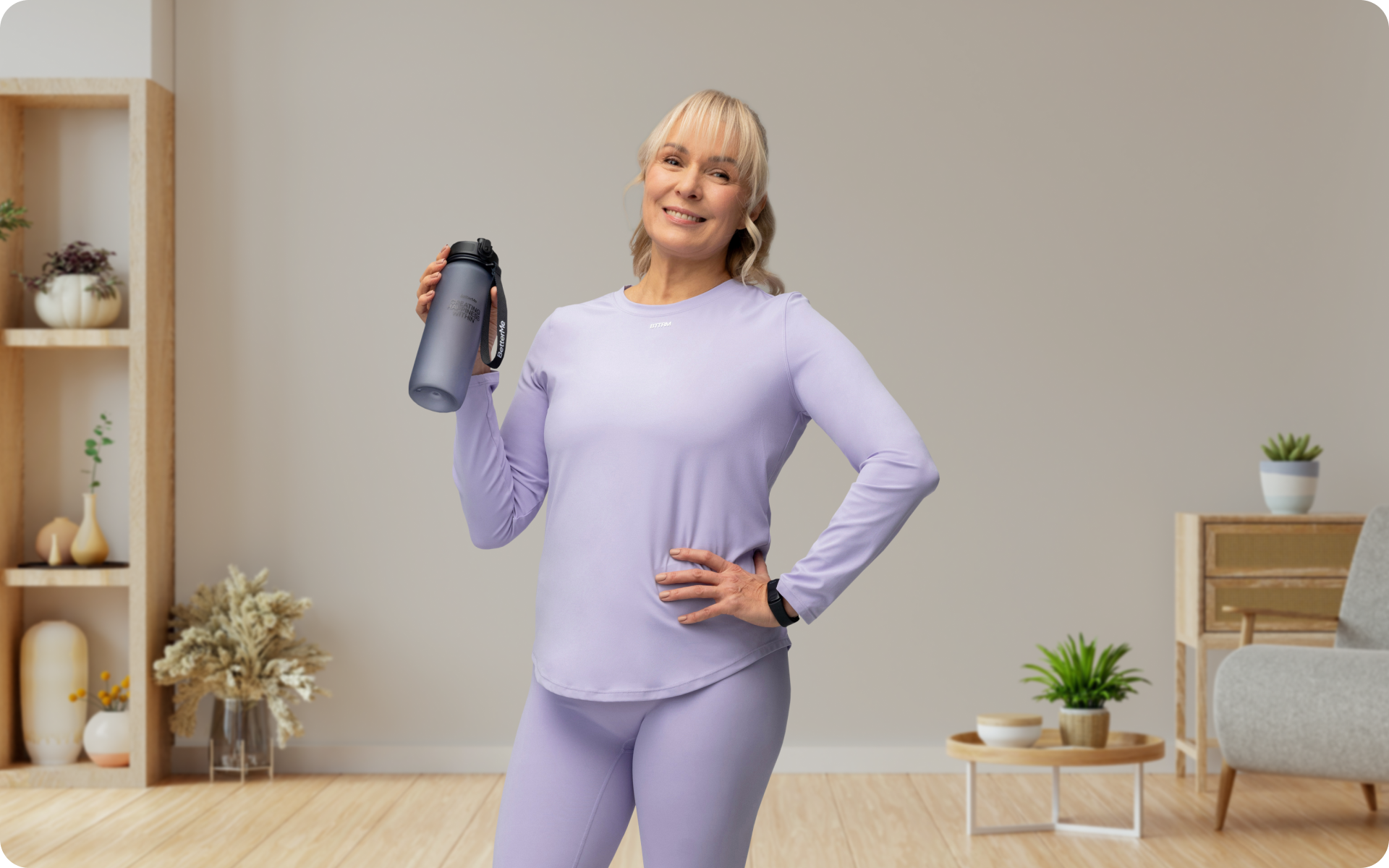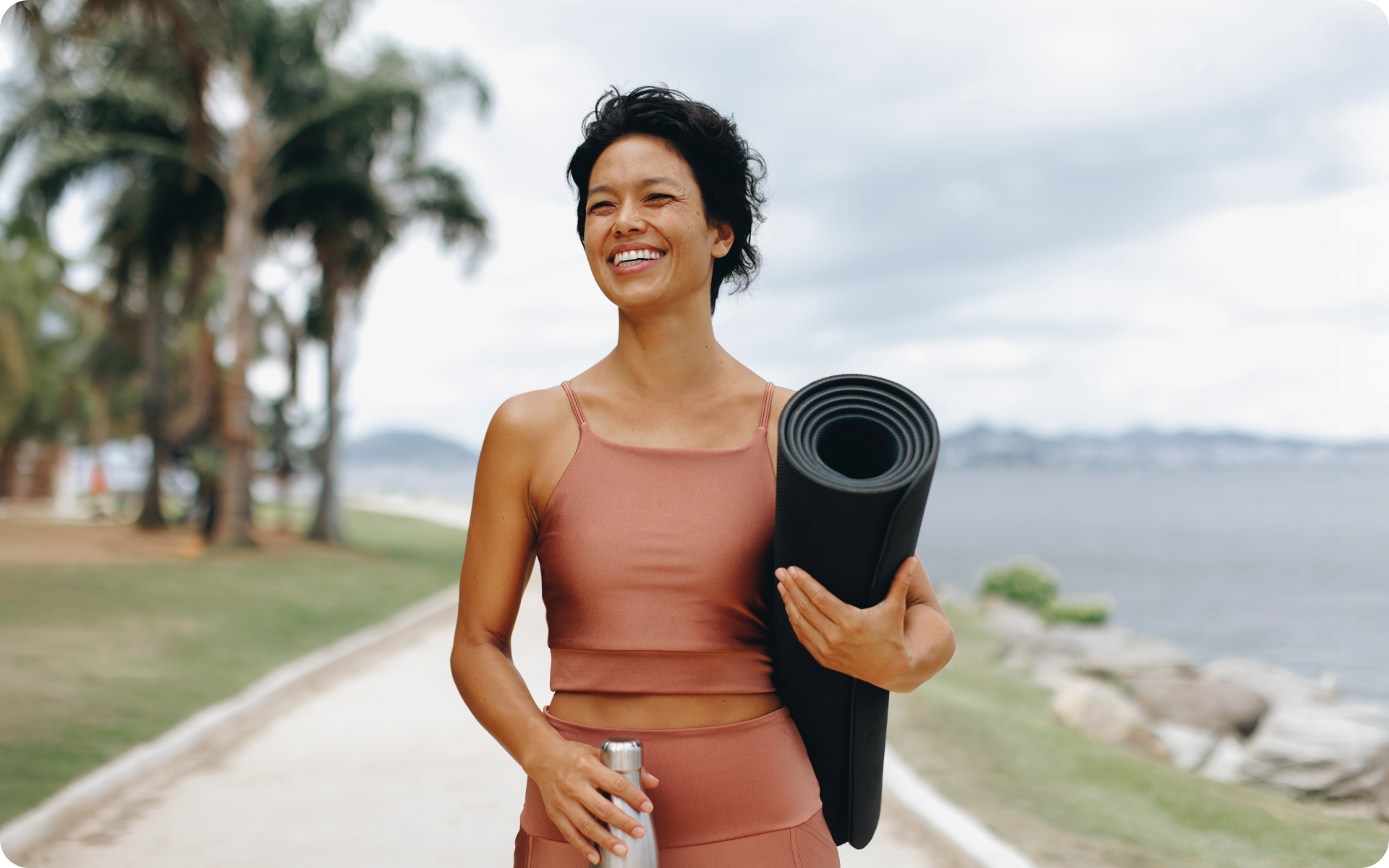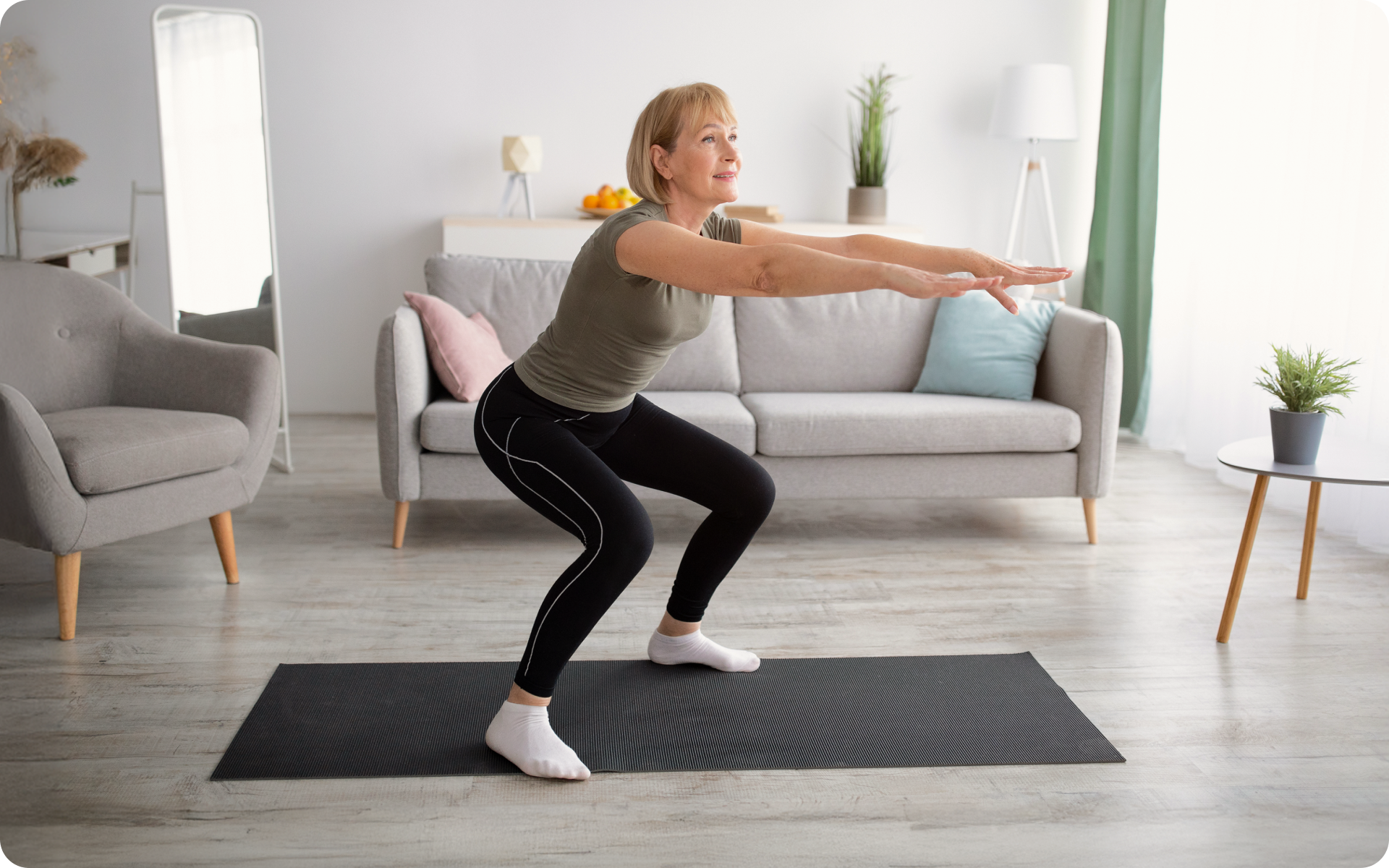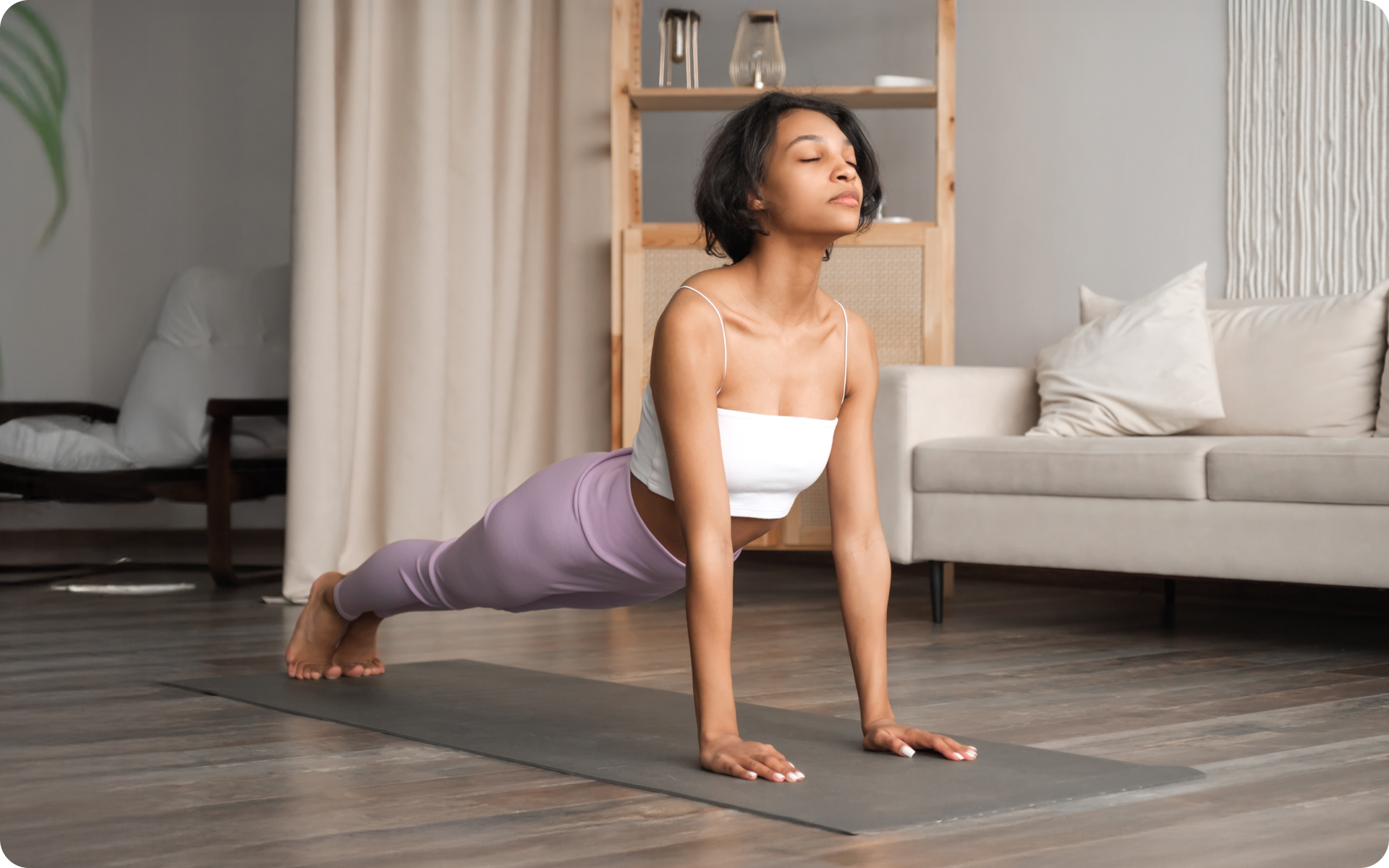Proper posture makes you look taller and more confident, radiating a presence that can influence both personal and professional interactions.
But that’s not all it’s good for; maintaining good posture is essential for your physical health too. Your spine supports the weight of your body best when it’s properly aligned, which reduces wear and tear on your joints and relieves strain on your ligaments (3). Also, you’re less likely to experience back and neck pain, two common ailments in our sedentary world.
To help you reap these benefits and correct common posture mistakes, here are 12 posture exercises worth adding to your routine. These exercises are designed to strengthen your core, back, and shoulder muscles, to ensure that your spine has the support it needs.
Can You Correct Years of Bad Posture?
Yes, you can fix poor posture permanently, with the help of a certified physical therapist or chiropractor. With consistent practice and targeted exercises, you can realign your spine and strengthen the muscles necessary for maintaining good posture.
Correcting years of bad posture won’t happen overnight. Usually, the longer you’ve been practicing poor posture, the more time and effort it will take to correct it. In some cases, this may also involve lifestyle changes, such as improving your workstation ergonomics or incorporating more movement into your daily routine.
Don’t let that discourage you; the benefits of proper posture are well worth the effort. Not only will you look better and feel more confident, but you’ll also reduce your risk of developing chronic pain and other health issues associated with poor posture.
Do Posture Exercises Work?
Posture exercises work; they are specifically designed to target the muscles responsible for maintaining good posture. By strengthening these muscles, you’ll be better equipped to support your spine in its natural and proper alignment.
However, doing posture exercises alone may not be enough to fix your posture completely. It’s essential to also address any underlying issues that may contribute to poor posture, such as weak muscles or joint imbalances. It’s always best to consult with a professional to develop an individualized plan that addresses your unique needs and concerns.
We’ve detailed the first steps in improving your posture in our how to improve neck posture article.
That said, the benefits of consistently practicing posture exercises include:
1. Improved Posture
As the name suggests, posture exercises are meant to improve your posture. By targeting and strengthening specific muscles, these exercises can help you maintain a neutral spine position and avoid slouching or hunching over (3).
2. Increased Core Strength
Many posture exercises focus on strengthening your core muscles, which play a crucial role in supporting your spine and promoting good posture. By consistently working on your core, you’ll also improve your balance and stability (4).
3. Reduced Risk of Injury
Good posture can prevent unnecessary strain and pressure on your muscles, joints, and ligaments. As a result, regular posture exercises can reduce your risk of developing injuries or chronic pain caused by poor alignment (2).
4. Better Breathing
Believe it or not, your posture can also affect your breathing. With good posture, you’ll have more room for your lungs to expand fully, allowing for deeper and more efficient breathing (2).
5. Enhanced Athletic Performance
Proper posture is essential for athletes, as it can improve their form and technique, leading to better performance and reduced risk of injury (2). By incorporating posture exercises into their training routine, athletes can maintain good posture and gain a competitive edge.
6. Improved Confidence
As mentioned earlier, good posture can give off an air of confidence and self-assurance. By consistently practicing posture exercises, you’ll not only improve your physical health but also boost your self-esteem and project a more confident image to others.
BetterMe is your fast-track ticket to a long-lasting weight loss! Tailor your fitness journey and maximize your results with just a couple of swipes!
What Exercise Is Best for Posture?
Upper back posture exercises that target the muscles responsible for pulling your shoulders back and keeping your spine in a neutral position are generally considered the best for improving posture. These include exercises such as rows, chest stretches, and shoulder retractions.
The best exercise for you will vary, depending on your specific needs and physical abilities. It’s always best to consult with a professional to determine the most effective posture exercises for your unique situation.
That said, here are twelve posture exercises worth incorporating into your routine:
Child’s Pose
The Child’s Pose is a restorative stretch that targets the muscles of the back, as well as the shoulders and thighs.
This exercise helps release tension from your spine and neck, which is crucial for improving posture, especially for individuals spending a lot of time sitting. This exercise can be particularly beneficial as part of posture exercises at home, offering a gentle way to enhance flexibility in the spine and improve overall body alignment.
Steps to execute Child’s Pose:
- Start on your hands and knees on a comfortable surface.
- Spread your knees wide while keeping your big toes touching, then sit back on your heels.
- Extend your arms forward on the floor, lowering your chest between your knees.
- Hold the position for 30 seconds to a few minutes, focusing on deep breathing and relaxing your lower back.
Forward Fold
The Forward Fold primarily stretches the hamstrings and lower back, but it’s also effective for releasing tension in the spine, neck, and shoulders. This flexibility in the posterior chain is essential for maintaining an upright posture and can be an effective posture exercise for seniors who may benefit from its simplicity and the minimal stress it places on the heart and joints.
Steps to execute Forward Fold:
- Stand upright with feet hip-width apart.
- Exhale as you hinge at your hips, bending forward.
- Allow your hands to reach towards the ground or your legs, depending on your level of flexibility.
- Keep a slight bend in your knees to avoid strain. Hold for a few breaths, then gently roll back up.
Read more: Thigh Workout Guide: 7 Effective Exercises for Building Leg Strength
Cat-Cow
The Cat-Cow stretch engages the spine, shoulders, and abdomen, making it one of the most effective upper back posture exercises. It promotes flexibility in the spine, strengthens core muscles, and helps with relieving tension in the torso, shoulders, and neck. This makes it an excellent posture exercise for men and women alike, promoting a stronger, more flexible back and core.
Steps to execute Cat-Cow:
- Begin on your hands and knees, making sure your knees are under your hips and your wrists are under your shoulders.
- Inhale as you lower your stomach towards the mat, lifting your chin and chest, coming into Cow pose.
- Exhale, drawing your belly to your spine, and round your back toward the ceiling into a Cat pose.
- Continue flowing between Cat and Cow for several breaths.
Thoracic Spine Rotation
Thoracic Spine Rotation is a mobility exercise that improves rotation in the upper back, an area often neglected in daily activities.
This exercise helps with correcting rounded shoulders and improves the range of motion, which is crucial for anyone looking to improve their posture, including posture exercises for seniors. Increased mobility in this area supports a healthier posture and can reduce discomfort from prolonged sitting or standing.
Steps to execute Thoracic Spine Rotation:
- Start by sitting on your heels in a kneeling position. Place your right hand behind your head, with your elbow pointed outwards.
- Place your left hand on the floor for support. Slowly rotate your upper body to the right, leading with your elbow, and try to look up towards the ceiling.
- Rotate back to the starting position. Repeat for several repetitions before switching sides.
Wall Angels
Wall Angels are one of the upper back posture exercises that focus on the muscles of the shoulders, upper back, and neck—areas critical for maintaining good posture. By engaging these muscle groups, Wall Angels help with retraining the body for better alignment, which can progressively correct slouching and rounded shoulders.
Steps to execute Wall Angels:
- Stand with your back against a wall, feet shoulder-width apart.
- Press your lower back, upper back, and head against the wall.
- Raise your arms with elbows bent at 90 degrees, so your upper arms are parallel to the floor and the backs of your hands touching the wall.
- Slowly slide your arms up overhead, keeping them close to the wall, then return to the starting position.
- Repeat for 10-15 repetitions.
We’ve also compiled more back exercises in our best rear delt exercises article.
Chest Opener
The Chest Opener targets the chest and shoulder muscles, which are pivotal in combating the forward-hunched posture common today. Regular use of this exercise as part of posture exercises at home can greatly diminish the risks associated with prolonged sitting and computer use.
Steps to execute Chest Opener:
- Stand or sit upright, clasp your hands behind your back.
- Gently straighten your arms, lifting them slightly and opening your chest.
- Hold this position for 20-30 seconds, breathing deeply.
- Release and repeat several times.
High Plank
High Plank exercises primarily engage the core, shoulders, and back muscles, strengthening them and promoting a solid foundation for good posture. This is one of the versatile posture exercises both men and women can utilize to build core stability and endurance.
Steps to execute High Plank:
- Start in a push-up position with your hands under your shoulders and your body in a straight line from head to heels.
- Engage your abdominals and keep your body rigid.
- Hold this position for as long as you can maintain good form, aiming for 30 seconds to a minute.
- Lower yourself back down and rest before repeating.
Quadruped Chin Tuck with Scapular Push-up
This exercise strengthens the neck, upper back, and shoulder muscles, directly addressing areas weakened by poor posture habits. It’s one of the effective posture exercises for seniors, offering a low-impact option to enhance muscle function and postural alignment.
Steps to execute Quadruped Scapular Push-up:
- Begin on your hands and knees, making sure your knees are below your hips and your wrists are under your shoulders.
- Gently pull your head back to align your head and neck with your spine.
- Without bending your elbows, lower your chest slightly towards the floor by squeezing your shoulder blades together.
- Push back up to the starting position by spreading your shoulder blades apart.
- Repeat for 10-15 repetitions, with smooth, controlled movements throughout.
If you’ve mustered up the courage to crush your weight loss goal, let Betterme take the sting out of this demanding process. Our app will help you restructure your habits, remold your life and crank up your fitness results!
Prone Lying Scapular Exercise
Prone Lying Scapular Exercise is a strategic addition to your repertoire of upper back posture exercises. It specifically targets the scapular muscles—the ones responsible for the movement and stabilization of your shoulder blades. Strengthening these muscles contributes to the alleviation of rounded shoulders and supports an upright posture.
Steps to execute Prone Lying Scapular Exercise:
- Lie face down on a flat surface, with your arms at your sides and palms facing down.
- Gently lift your shoulders and chest off the ground by squeezing your shoulder blades together. Keep your neck in a neutral position.
- Hold the lift for a few seconds, then slowly lower back down.
- Repeat for 10-15 repetitions, focusing on the activation of the scapular muscles.
Seated Band Pull-Apart
A wonderful posture exercise at home, the Seated Band Pull-Apart focuses on the rear deltoids, rhomboids, and trapezius muscles. These muscle groups are key for pulling back the shoulders and improving upper back strength, essential factors in maintaining a good posture.
Steps to execute Seated Band Pull-Apart:
- Sit upright on a chair with your feet planted firmly on the ground.
- Hold a resistance band in front of you at chest level, with both hands shoulder-width apart.
- Pull the band apart by moving your arms to the sides, squeezing your shoulder blades together as you do.
- Return to the starting position with control.
- Perform 10-15 repetitions, maintaining a strong, upright posture throughout the exercise.
Dead Bug Variation
The Dead Bug Variation is among the core-centric posture exercises men and women can perform to enhance their core stability and coordination. By engaging your deep abdominal muscles, it lays the foundation for a stronger posture, supporting your upper body effectively.
Steps to execute Dead Bug Variation:
- Lie on your back with your arms extended towards the ceiling and knees bent at 90 degrees, over your hips.
- Slowly lower your right arm and left leg towards the floor, keeping your lower back pressed into the ground.
- Return to the starting position and repeat with the opposite arm and leg.
- Continue alternating sides for 10-20 repetitions, focusing on the stability of your core throughout.
Doorway Stretch
Particularly beneficial as one of the posture exercises for seniors, the Doorway Stretch targets the chest and shoulder muscles. Tightness in these areas often contributes to a forward, hunched posture, making this stretch invaluable for improving flexibility and encouraging a more open chest.
Steps to execute Doorway Stretch:
- Stand in a doorway with your arms on the doorframe, elbows bent at 90 degrees.
- Gently lean forward until you feel a comfortable stretch in your chest and shoulders. Keep your back straight and avoid arching.
- Hold this position for 20-30 seconds, breathing deeply.
- Release and repeat a few times, progressively trying to increase the depth of the stretch.
Read more: 10 Best Glute Exercises To Add To Your Routine and Why
The Bottom Line
Good posture is crucial for both physical and mental well-being, and incorporating posture exercises into your routine can help you achieve and maintain it. Remember, correcting years of bad posture takes time and effort, but the benefits are worth it. By consistently practicing these 12 posture exercises, you’ll not only improve your posture but also enhance your overall health and confidence.
DISCLAIMER:
This article is intended for general informational purposes only and does not serve to address individual circumstances. It is not a substitute for professional advice or help and should not be relied on for making any kind of decision-making. Any action taken as a direct or indirect result of the information in this article is entirely at your own risk and is your sole responsibility.
BetterMe, its content staff, and its medical advisors accept no responsibility for inaccuracies, errors, misstatements, inconsistencies, or omissions and specifically disclaim any liability, loss or risk, personal, professional or otherwise, which may be incurred as a consequence, directly or indirectly, of the use and/or application of any content.
You should always seek the advice of your physician or other qualified health provider with any questions you may have regarding a medical condition or your specific situation. Never disregard professional medical advice or delay seeking it because of BetterMe content. If you suspect or think you may have a medical emergency, call your doctor.
SOURCES:
- 3 surprising risks of poor posture (2023,harvard.edu)
- 7 Benefits of Improved Posture (2020,usa.edu)
- Getting It Straight (2017,nih.gov)
- The real-world benefits of strengthening your core (2012,harvard.edu)
- Why You Should Start Doing Planks (2021.clevelandclinic.org)

